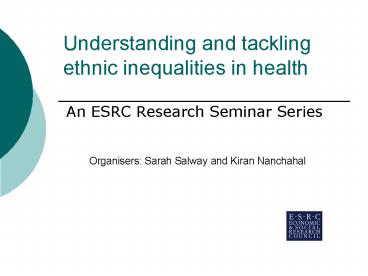Understanding and tackling ethnic inequalities in health PowerPoint PPT Presentation
1 / 15
Title: Understanding and tackling ethnic inequalities in health
1
Understanding and tackling ethnic inequalities in
health
- An ESRC Research Seminar Series
Organisers Sarah Salway and Kiran Nanchahal
2
Background
- Interest in links between race, ethnicity
health is not new. - Huge increase in available data, and significant
shift in policy, in last 10-15 years. - Evidence of large and persistent inequality (and
diversity) in many aspects of social, economic
and health-related well-being between ethnic
groups. - Growing number of ethnic health researchers.
- Increased programme activity at local level.
3
Background (2)
- Improving health of minority ethnic groups
central component of governments agenda to
reduce social exclusion and inequalities in
health - Significant action at policy level across many
government departments new research programmes,
new focused interventions, and new targets for
achieving reduction in ethnic minority
disadvantage. - Increased recognition of ways in which different
dimensions of disadvantage inter-relate.
4
Background (3)
- Wide range of factors contribute to health
outcomes in ethnic minority groups - Differential access quality of health services
- Socio-cultural influences
- Socio-economic disadvantage
- Racial discrimination
- Migration and life events
- Genetic or biological variation
- Need cross-disciplinary methods of enquiry and
multi-sector intervention
5
ESRC Research Seminar SeriesAims and objectives
- Promote discussion networks between academic
researchers and strengthen their contribution to
long term health of the social sciences - Value to research
- Setting or enhancing personal research agendas
- Increasing range of personal research contacts
- Increasing degree of collaborative research
- Value to policy makers
- Impact on knowledge and perceptions of the
research field - Political impact on area of operation or policy
6
Aims of this seminar series
- To bring together academics from wide range of
institutional settings, practitioners,
policy-makers, and other users of research. - To share current knowledge regarding patterns and
determinants of health among different ethnic
groups, as well as best practice in researching
ethnicity and health. - To engage in debate surrounding current issues
and challenges regarding the generation and
application of knowledge to effective practice.
7
Some issues and challenges
- What is ethnicity? fluid and complex
- Health-focused research often not based on
theoretical framework. - How can inequality be understood, monitored and
addressed if categories keep shifting? - How can greater understanding of lived
experiences What I am, and What it means to
be me, be put to practical use to bring about
positive change? - Potential pitfalls of attention to ethnicity
- Reification of ethnic groups and contribution
to boundaries of exclusion. - Lack of representation of powerless groups,
racism, victim-blaming, stereotyping. - Overlooking of other axes of inequality (and
their inter-relationships).
8
Issues and challenges (2)
- Ever-increasing diversity (countries of origin,
life-stage, generation, class) - Is detailed understanding of particular
situations useful? - Can we expect to tailor services to meet diverse
needs? - Or, should generic cultural competencies be the
objective? - Can investigations move beyond the descriptive to
the predictive? - Problems of generalisability of findings over
time, e.g. current studies on older groups.
9
Issues and challenges (3)
- Translating knowledge into policy and practice
- Gap between academia and world of service
provision - Need for more researcher-practitioners and
multi-experience teams. - Danger of nuanced interpretations being
translated into stereotypical responses. - What should be the boundaries of the health
sector? - Who should be concerned about ethnic minority
health? - What other issues should concern health
practitioners? - How can local knowledge be built upon?
- What models of participation empowerment work
well? - How can local initiatives be scaled up
effectively?
10
Participation in the series
- Sectors
- Academics
- Policy makers
- Service providers
- Hierarchy
- Senior/ Junior staff
- Suggestions for
- Speakers discussants
- Publicity
- Feedback
- New collaborations?
- New initiatives?
- New ways of looking at things?
11
Seminars convenors (2005)
- Understanding the links between socioeconomic
deprivation health among ethnic minority groups - Using assessments of biological and genetic risk
to inform policy priorities - Gender, generation and identity socio-cultural
constructions and their influences on health
- 1. February 2005, LondonJames Nazroo Sarah
Salway - 2. June 2005, LeedsKarl Atkin Elizabeth
Anionwu - 3. October 2005, LondonSeeromanie Harding
Kiran Nanchahal
12
Seminars convenors (2006)
- 4. January 2006, WarwickDavid Owen Hannah
Bradby - 5. April 2006, LeicesterMark Johnson Raj
Bhopal - 6. July 2006, SheffieldKate Gerrish Sarah
Salway
- Migration, trans-national links and life-course
influences on health - Cultural competence in health and social research
- Evidence into practice increasing
appropriateness and cultural competence of health
and social care provision
13
Up-to-date information
- URL www.shef.ac.uk/ethnichealthinequalities
14
Many thanks to..
- ESRC for providing funding
- The Brady Centre
- Our speakers and discussants
- Linda Belk for administration
- All participants
15
A reminder
- Seminar 2
- June 2005, Leeds
- Convenors Karl Atkin Elizabeth Anionwu
- Using assessments of biological and genetic risk
to inform policy priorities - www.shef.ac.uk/ethnichealthinequalities

